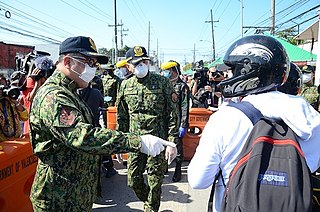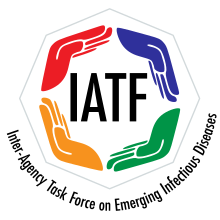
Eduardo Manahan Año is a Filipino public official and retired general of the Philippine Army who currently serves as the National Security Adviser under the administration of President Bongbong Marcos since 2023. He previously served as Secretary of the Interior and Local Government in the Cabinet of President Rodrigo Duterte from 2018 to 2022, the Chief of Staff of the Armed Forces of the Philippines from 2016 to 2017, and the Commanding General of the Philippine Army from 2015 to 2016. At the onset of the COVID-19 pandemic in the Philippines, Año, along with the rest of the Philippine government's Cabinet Secretaries, became part of the Inter-Agency Task Force for the Management of Emerging Infectious Diseases, a task force formed to advise the President on the strategies which would effectively manage the spread of COVID-19 in the country.
The 2020 Philippines Football League, also known as The Philippines Football League brought to you by Qatar Airways, due to the league's title sponsorship, was the fourth season of the Philippines Football League (PFL), the professional football league of the Philippines.

The 2020 PBA season or PBA Season 45 was the 45th season of the Philippine Basketball Association.

The COVID-19 pandemic in the Philippines was a part of the worldwide pandemic of coronavirus disease 2019 caused by severe acute respiratory syndrome coronavirus 2. As of August 17, 2024, there have been 4,140,383 reported cases, and 66,864 reported deaths, the fifth highest in Southeast Asia, behind Vietnam, Indonesia, Malaysia, and Thailand. The first case in the Philippines was identified on January 30, 2020, and involved a 38-year-old Chinese woman who was confined at San Lazaro Hospital in Metro Manila. On February 1, 2020, a posthumous test result from a 44-year-old Chinese man turned out positive for the virus, making the Philippines the first country outside China to record a confirmed death from the disease.

The COVID-19 pandemic in Metro Manila was a part of the worldwide pandemic of coronavirus disease 2019 caused by severe acute respiratory syndrome coronavirus 2. The virus reached Metro Manila on January 30, 2020, when the first case of COVID-19 in the Philippines was confirmed in Manila. Metro Manila is the worst affected region in the Philippines, where most cases in the country are recorded. A state of calamity and community quarantine was declared in the region on March 15.

The enhanced community quarantine in Luzon was a series of stay-at-home orders and cordon sanitaire measures implemented by the Inter-Agency Task Force for the Management of Emerging Infectious Diseases (IATF-EID) on the island of Luzon and its associated islands. It is part of the COVID-19 community quarantines in the Philippines, a larger scale of COVID-19 containment measures with varying degrees of strictness. The "enhanced community quarantine" (ECQ) is the strictest of these measures and is effectively a total lockdown.
Coronavirus Task Force may refer to:
COVID-19 community quarantines in the Philippines were a series of stay-at-home orders and cordon sanitaire measures that were implemented by the government of the Philippines through its Inter-Agency Task Force for the Management of Emerging Infectious Diseases (IATF-EID).
The COVID-19 pandemic in the Ilocos Region is part of the worldwide pandemic of coronavirus disease 2019 caused by severe acute respiratory syndrome coronavirus 2. The virus reached the Ilocos Region on March 20, 2020, when the first cases of the disease were confirmed in the provinces of Pangasinan and La Union.
The COVID-19 pandemic in Bangsamoro is part of the worldwide pandemic of coronavirus disease 2019 caused by severe acute respiratory syndrome coronavirus 2. The virus reached the Bangsamoro Autonomous Region in Muslim Mindanao on March 11, 2020, when the first case of the disease was confirmed in Lanao del Sur. Cases has been confirmed in Lanao del Sur, Maguindanao, and the independent city of Cotabato.
The COVID-19 pandemic in Zamboanga Peninsula is part of the worldwide pandemic of coronavirus disease 2019 caused by severe acute respiratory syndrome coronavirus 2. The virus reached Zamboanga Peninsula, Philippines on March 24, 2020, when the first case of the disease was confirmed in Zamboanga City. All provinces including the cities of Zamboanga and Isabela have recorded at least a single case.

Both the national government and local governments have responded to the COVID-19 pandemic in the Philippines with various declarations of emergency, closure of schools and public meeting places, lockdowns, and other restrictions intended to slow the spread of the virus.

The Philippine Senate Committee on Health and Demography is a standing committee of the Senate of the Philippines.

The 2021 PBA season was the 46th season of the Philippine Basketball Association. Due to the COVID-19 pandemic, the season's start, originally scheduled on April 11, 2021, has been delayed until July 16, 2021. The league's Board of Governors announced that the season had two conferences: the Philippine Cup and the Governors' Cup.
The COVID-19 vaccination program in the Philippines was a mass immunization campaign against severe acute respiratory syndrome coronavirus 2 (SARS-CoV-2), the virus that causes coronavirus disease 2019 (COVID-19), in response to the pandemic in the country. The vaccination program was initiated by the Duterte administration on March 1, 2021, a day after the arrival of the country's first vaccine doses which were donated by the Chinese government.
Leopoldo "Bong" Jumalon Vega is a Filipino physician, surgeon and former hospital administrator serving as an undersecretary of the Department of Health since 2020. Prior to joining the administration of President Rodrigo Duterte, he served as medical center chief of the state-run Southern Philippines Medical Center in Davao City for twelve years. On July 13, 2020, Vega was appointed to the National Task Force Against Coronavirus under the Inter-Agency Task Force for the Management of Emerging Infectious Diseases as COVID-19 Treatment Czar.
Misinformation related to the COVID-19 pandemic in the Philippines consists of disinformation about the COVID-19 pandemic propagated by various sources.
StaySafe.ph or Stay Safe is a digital contact tracing app launched by the Philippine government as a response to the COVID-19 pandemic in the Philippines. The mobile app was developed and published by MultiSys Technologies Corporation.
SafePass is a digital contact tracing app used as a response against the COVID-19 pandemic in the Philippines.








